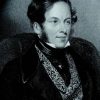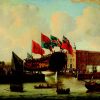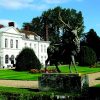In the context of the colonisation of South Australia, Sir Henry George Ward is best described as a Philosophical Radical. He came to the Reform Parliament as the member for St Albans in January 1833, and then later as the member for Sheffield between 1837 and 1849. His experience in the Republic of Mexico in the mid-1820s qualified him to take up a succession of further diplomatic postings overseas. He is memorialised in Ward Street, North Adelaide because he was a member of the Provisional Committee of the South Australian Association at the end of 1833, and thereafter a strong supporter of the Wakefield principle.
The only son of Robert Plumer Ward and Catherine Julia Maling of County Durham, he was born in London on 27 February 1797. His paternal grandfather was a merchant resident of Gibraltar; his grandmother of Jewish descent. Henry George’s father, Robert, was a graduate of Christ Church, Oxford who spent time in revolutionary France before taking up distinguished successive careers in law, politics and literature. He entered the House in 1802 and served in the Tory ministry of William Pitt (the younger) as Under Secretary to the Foreign Office from 1805 to 1811.
With such a family background it was almost inevitable that Henry George Ward would be given opportunities in life that other boys might only dream about. He was educated at Harrow, subsequently sent abroad to learn languages and at 19 entered the diplomatic service as a voluntary attaché to the British Legation in Stockholm, in 1816. This was the precise timeframe in which Edward Gibbon Wakefield also served in the diplomatic corps as an attaché to the British Legation at Turin.
It has been suggested that Ward was appointed to this privileged position because of the parliamentary influence his father had with Lord Castlereagh. Successive appointments for Ward followed in The Hague in 1818 and Spain in 1819. When Lord Castlereagh committed suicide, Ward thought his patronage had dried up. Much to his surprise, however, his good common sense and ability to speak fluent Spanish had not gone unnoticed, even by the Duke of Wellington. So, in 1823 Henry George Ward was appointed Joint Commissioner to Mexico with Lionel Charles Hervey, another colleague from his time in Madrid.
Heartened by his prospects, Ward at last felt able to seek the hand of the talented and artistic Emily Elizabeth Swinburne, whom he had known for some years. She was the second daughter of Sir John Swinburne of Capeheaton and an aunt to the famous poet, Algernon Charles Swinburne. They were wed on Thursday 8 April 1824 in St George’s in Hanover Square, London.
A few weeks later George Canning, who was by then both Foreign Minister and Leader in the Commons, promoted Ward to chargé d’affaires and he and Emily left Plymouth for Mexico in the first days of January 1825.
Described as Minister Plenipotentiary, Ward was, in contemporary terminology, an envoy on a diplomatic mission and therefore part of a legation to the new Republic of Mexico, with status just short of an ambassador. He was charged with establishing a treaty with the Guadalupe Victoria, the first constitutional president of Mexico after the break with Spain in 1821. Mexico had been dominated by Spain for more than 300 years.
To be given the task of building an economic and diplomatic relationship between President Guadalupe Victoria’s Mexican administration and the British Government before he turned 30 shows the high degree of confidence the Colonial Office had in Ward. In some ways, however, he let the power of his position go to his head and he unfortunately incurred financial liabilities, which Canning and the Foreign Office eventually decided were unreasonable. Canning recalled him, which put a dull tarnish on all the good work he had achieved in Mexico. Professionally chastened but no less profligate in his addiction to largesse, Henry and his growing family returned to England, where he began to look elsewhere for other career opportunities.
Somewhat fortuitously H.G. Ward, as he became known, now found himself on the cusp of social change and parliamentary reform in Britain. His head was spinning with ideas and possibilities gleaned from his travels. Unsurprisingly, he became preoccupied with progressive ideas. This was at the very time Wakefield was writing A letter from Sydney from his jail cell in Newgate Prison and Robert Gouger had begun releasing some of Wakefield’s seminal ideas in the pamphlet press. As a result, colonial land and agriculture companies began springing from the London clubs like mushrooms.
With a family of three girls and two boys that would later grow to ten children, Henry coveted a settled home life and certainty for the education of his children. A parliamentary seat in the new Reform Parliament seemed an obvious way forward, so he offered himself for the seat of St Albans and sought a mandate from the landholders and tenants of the borough. This seat had a reputation for bribery and corruption which extended back to an earlier time.
Ward spent what was considered an inordinate amount of money on his two elections for the seat – £12,000 in all, which nearly emptied the family coffers. Presumably some of this was expended in the traditional way, by lubricating voters from the hustings and in the ale houses. Nevertheless, he was returned as the new member and took his seat in the Reform Parliament in January 1833. Again, he was financially troubled and arguably guilty of extravagance – but at least he won the seat!
There can be no doubting that Ward was liberal and a Benthamite. Ironically, this put him totally out of step with his father and other members of his paternal family who were steadfast Tories. Just how he managed to keep the peace in this respect remains a mystery. He took a strong position in the House as one of the more outspoken Philosophical Radicals. As the upheaval of the reform period began to recede, the more libertine elements of the new parliament and the Whigs inevitably began to converge philosophically. Some members began to think of Ward as a Whig.
His start in the House of Commons might have been described as inauspicious, but by this time he had shown sufficient form to be considered for a junior ministerial post under Lord John Russell. Ward’s most lasting and pivotal contribution in the parliament concerned the surplus revenues generated by the Irish Episcopalian (Anglican) Church, of whom he was a constant critic. Without fully appreciating the impact of a motion he put before the House, he is today credited with the parliamentary idea of appropriation. He conceived both the principle and the terminology of this governmental procedure, which has been used with such profound effect by democratically elected governments ever since.
Starting from the premise that the inordinate amount of church revenue generated by the Anglican Church in Ireland was way beyond the needs of the population it served, he couldn’t understand why the parliament should not take some of it and spread it around more widely in the Irish community, where it was needed. This was a motion which gave little regard to the separation of powers between church and state. Ward’s vote was defeated and he very quickly became identified with the new radicals in the parliament.
Although Henry George Ward will ever be remembered for the term ‘appropriation’ in the House, he was a strong supporter of many other liberal initiatives including free trade, the annual ballot, wider voter enfranchisement, autonomy for colonial governments and the relief of social distress, especially by colonisation.
Ward’s special association with South Australia had much to do with his understanding and appreciation of the principles of colonisation, which was expressed in several ways. In October 1833, when Wakefield published England and America in which he elaborated his underlying principles, a rush of interest and excitement ran through polite libertine circles in London. Gouger was ecstatic with the response to the book and hastily convened a provisional committee of like-minded influentials, including Grote, William Clay, Ward and William Wolryche Whitmore (in absentia), who met on 2 December 1833 to form what became known as the South Australian Association. Ward was not central to the project, but he was in attendance and gave support from the outset.
By 1836 Ward’s parliamentary presence had grown to the point where he was given important committee responsibilities including chairmanship of the Colonial Lands Committee. In 1837 he joined William Molesworth’s Parliamentary Committee on Convict Transportation and the Select Committee of the House of Commons into the conduct and administration of lunatic asylums. He was also a member of the Imperial Select Committee into South Australian Affairs of 1841, which had become necessary due to the problems of colonial administration in Adelaide.
In private life Ward was a member of the inaugural governing committee of the Reform Club in Pall Mall, which echoed with banter and discourse about colonies, reform, investment and opportunities for trade in the new world.
With such a large family of ten children, it is not surprising that H.G. Ward had an interest in the subject of child endowment. There were many advertisements in the popular press of the mid-1830s where he was named along with Pascoe St Leger Grenfell as one of the directors of The Family Endowment Society.
By the 1840s the Philosophical Radicals were almost extinct as a parliamentary force, and Ward’s influence in the parliament was now tempered by his decaying financial position.
Against wiser judgement Henry purchased the Weekly Chronicle from Henry Cole and Charles Buller, and took up many utilitarian questions of the day. He argued against the Chartists; for free trade; a widened electoral franchise; the relief of hardship among the poor by colonisation; and the abolition of penal servitude. As was the case with many of these small newspapers it ran at a loss. Some poor railway company speculation and losses associated with the family estate at Gilston Park, in Hertfordshire, which he materially inherited in 1838, forced him to inevitably look to a salaried post with the government rather than a seat in parliament with the Whigs.
In August 1839 Ward had the luxury of refusing an offer from Lord Melbourne to become Secretary to the Board of Control, but by 1846 his circumstances had changed so much that he happily accepted an appointment as First Secretary to the Admiralty.
In 1849 he was back on the diplomatic circuit and there followed a succession of overseas appointments. He was offered the post of Lord High Commissioner in the Ionian Islands, which he held till 1855.
At the same time he was appointed GCMG – an order of chivalry designated as a Knight Grand Cross of the order of St Michael and St George.
In 1855 he was appointed by the Colonial Office as Governor of Ceylon. He travelled widely in the provinces and as a result, the Ceylonese soon had a railway, electric telegraph, new roads, bridges, canals and some dedicated irrigation works for the Eastern Province. He re-established steam ship communication in the northern and eastern provinces and abolished polygamy, which had been entrenched for generations because it was inextricably linked to family property settlement.
Ward was further promoted to Governor of the Indian state of Madras. He took up this appointment in 1860, but only weeks into his term of tenure he succumbed to cholera.
Sir Henry George Ward is a significant member in the ‘pantheon of dissent’. He died penniless on 30 June 1860. His effigy was carved in stone in Kandy and his mortal remains are buried in St Mary’s Church, in Madras (now Chennai).







Comments